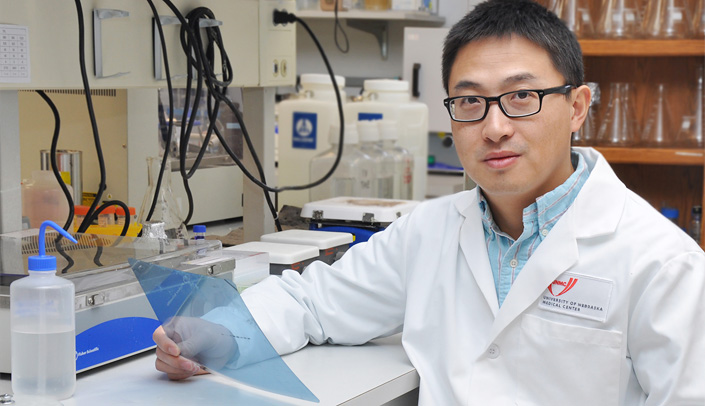Aimin Peng, Ph.D., has been battling cancer throughout his career.
His focus is DNA damage response in cells, particularly cancer cells. The goal is to determine why some cancer cells are resistant enough to the DNA damage caused by radiation or chemotherapy to survive or recover following these cancer treatments.
Dr. Peng began work in this area 13 years ago as a graduate student at the University of Texas Health Science Center in San Antonio.
“I was determined to work in cancer research,” Dr. Peng said. “In Texas, I learned about different types of research. I decided that DNA damage response was something I wanted to focus on because it’s so relevant to cancer – both in the disease etiology and from the therapeutic standpoint.”
A stint at the University of Colorado as a postdoctoral researcher allowed him to explore biochemical systems, including some methods he still uses today.
“Dr. Peng is an outstanding young research scientist,” said John Reinhardt, D.D.S., dean of the College of Dentistry, where Dr. Peng holds a faculty appointment as an assistant professor of oral biology and is affiliated with the Center for Cellular Signaling. “His work in improving cancer therapy, in particular by studying how malignant tumors can be prevented from recurring, brings great hope for new and more effective cancer treatment options.”
The fact that Dr. Peng received an R01 within three years of his arrival at the College of Dentistry speaks to the significance of his work on cell cycle regulation and the DNA response in cancer, said Jeffrey Payne, D.D.S., professor and associate dean for research at the college.
“The goal of his research program is to obtain a better understanding of these pathways, which can potentially lead to more effective cancer treatments,” Dr. Payne said. “We are pleased to have him on our faculty.”
“Aimin Peng is an exceptional young faculty member with the characteristics one sees in an outstanding scientist,” said David Shaw, Ph.D., chair of oral biology. “He’s bright, insightful and hardworking, with a genuine, underlying passion for science.”
Little is understood about how cancer cells escape from radiation or chemotherapy treatments and continue proliferation, a process termed checkpoint recovery. Dr. Peng’s lab uses comprehensive approaches to delineate the mechanism of this process and directly validate new therapeutic targets for enhanced cancer therapy.
“This research area has been a hot spot for years,” he said. “All the cancer genetics people were trying to find tumor-suppressing genes. Genes that mutate in cancers probably are driving forces of cancer progression. By investigating this pathway, we learned a lot about why cancer occurs. But still, there are things we don’t know, so by continually working and investigating this research area, we hope to find more mechanistically how cancer occurs.”
Radiotherapy or chemotherapy kills cancer cells primarily through induction of DNA damage. Therefore, as Dr. Peng outlined in a recent grant abstract, mechanisms that allow cells to recover from the DNA damage response and return to cell proliferation are critical for tumor recurrence. They also are ideal targets for cancer therapy.
Today, his lab works to reveal a new mechanism of DNA damage recovery and tumor recurrence after chemotherapy, thereby providing better understanding of chemoresistance and potentially leading to more effective cancer therapeutics. This line of research would not only provide insight into cancer occurrence, but also offer avenues for prevention and early diagnosis.
“Some types of cancer cells are just resistant to radiation and chemotherapy – and we really need to know why,” he said. “There are these processes and pathways that are responsible for cancer cells – for all cells, really – to be able to recover from DNA damage. But some cancer cells just hijack that pathway, and they can escape from intense DNA damage conditions, such as after radiation or chemotherapy. We think that’s at least one of the major reasons why some cancer cells can be so resistant.”
It is a project Dr. Peng already has spent several years on, yet he remains excited.
“I enjoy it,” he said. “It is challenging, and you’re always thinking, you always learn new things you didn’t know the day before – and that nobody else knew, either.
“We know the ultimate goal is to help public health, to contribute to a better understanding of cancer and better therapy. But we are realistic enough to know that’s not something we can achieve with one project or in a few years.
“So what keeps us excited, in addition to knowing the ultimate goal and the fact that we are heading toward that goal, is that every day we make new discoveries. We are interested in the detailed mechanistic aspects of those biological processes, so we keep learning new things. Even just a single step is going to keep us excited.”
